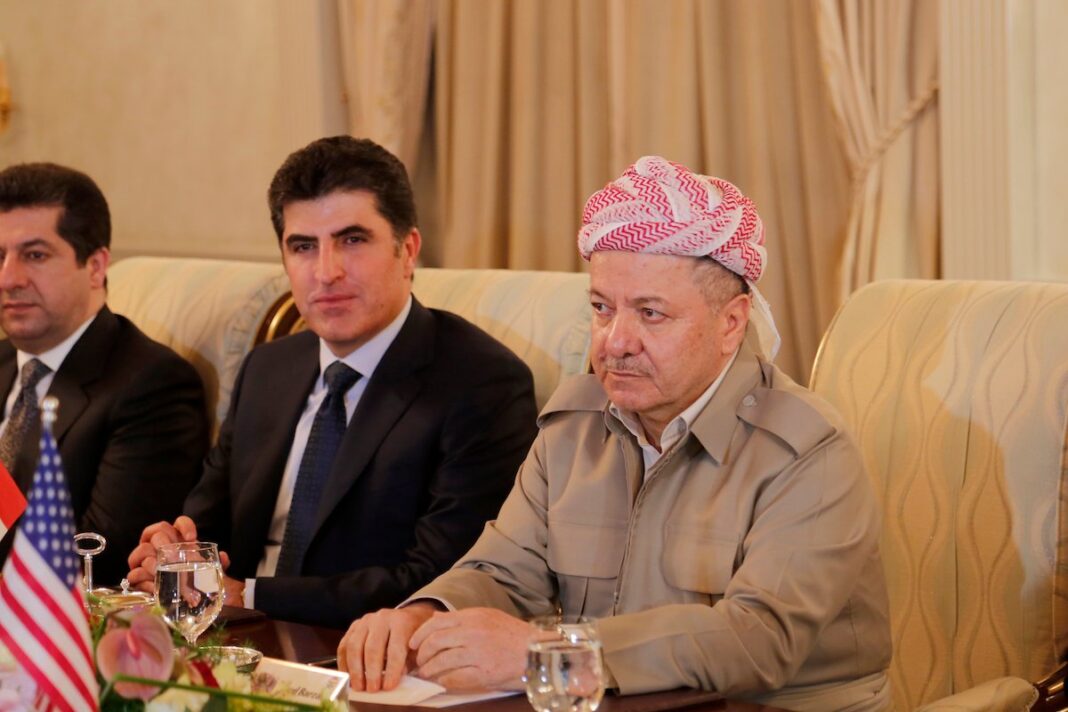“Kak Masoud! Guard the city just tonight.” This is what late Iranian commander General Soleimani had told former president of the Kurdistan Region Masoud Barzani when the ISIS fighters were closing in around the city of Erbil in 2014.
The above is part of an exclusive interview with Barzani, published in Turkish daily newspaper Zaman on January 8, 2015.
In the interview, entitled “How Did Erbil Survive?”, the then president of the KRG acknowledged the leading role that the popular Iranian commander had played in preventing the city from falling to the self-proclaimed caliphate of ISIS.
Following is an excerpt of Masoud Barzani’s 2015 interview with Zaman:
Zaman: We know that Erbil was about to fall to Daesh (ISIS). What happened that Daesh could not enter the city?
Barzani: That’s right. Everybody knows that Daesh had reached the doorstep of Erbil, and there were concerns about an immediate occupation of the city. After the Daesh assault, I called the Americans, the Turks, the UK, France and even Saudi Arabia, but all officials of those countries replied that they could not provide any help for now.
I immediately called up the Iranian authorities, and made it clear for them that the city was going to fall. I said ‘if you cannot help, we will evacuate the city’. Then the Iranian officials immediately gave me Qassem Soleimani’s contact number, saying ‘Haj Qassem is our plenipotentiary representative in the affairs of war on Daesh’.
So I phoned Haj Qassem right away and described the conditions exactly. Haj Qassem told me ‘I will be in Erbil tomorrow morning after the morning prayers’. I told him that ‘tomorrow would be late, come here right now’.
Haji (General Soleimani) said ‘Kak Masoud! Guard the city just tonight’.
Haj Qassem arrived in Erbil’s airport the next morning. I went there to receive him. Haji had come with 50 men from his special forces. They immediately departed for the clash zone and reorganized the Peshmerga forces. The battle turned in our favor within a couple of hours. Moreover, the Iranian arms supplies were delivered to us. Haj Qassem kept a number of his forces in Erbil for military advice, and returned to Karbala himself.
Later, we captured a commander of Daesh, and asked him how their forces retreated suddenly while they were about to conquer Erbil. The Daesh captive told us ‘our infiltrators in Erbil reported that Qassem Soleimani was in Erbil. So the morale of our men was destroyed and we retreated’.
Asked by Zaman about the war in Kobane, Masoud Barzani said, “Without the guidance of General Soleimani, Daesh would have created a big massacre in Kobane, and we owe our life to General Soleimani.”
Despite the open acknowledgement that the Iraqi Kurdistan Region and its capital city owe their security to the late Iranian commander, Masoud Barzani’s nephew and successor, Nechirvan, has not bothered to honor General Soleimani meritoriously.
Not only didn’t the incumbent KRG president attend the funeral of General Soleimani in Iran, he sent a short and formal letter of condolence to Leader of Iran’s Islamic Revolution Ayatollah Seyyed Ali Khamenei three days after the martyrdom of the popular commander in Iraq.
Nechirvan Barzani’s refusal to condemn the US for assassinating General Soleimani appears to be a sign he is still counting on Americans. However, a review of what happened to the Syrian Kurds could teach Nechirvan many lessons. A Persian proverb says that a wise man should keep the lantern for the time of darkness, something similar to the English expression “don’t bite the hand that feeds you”.
